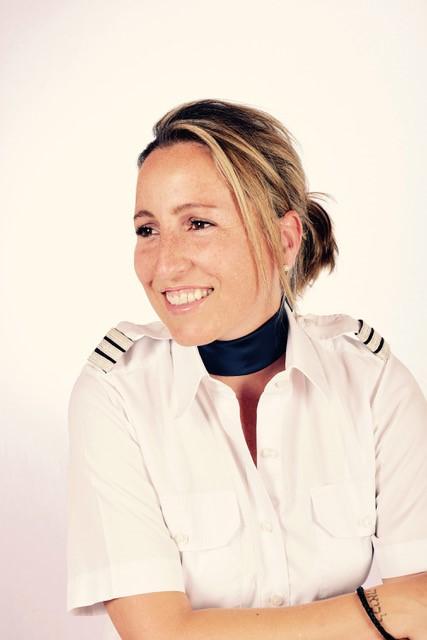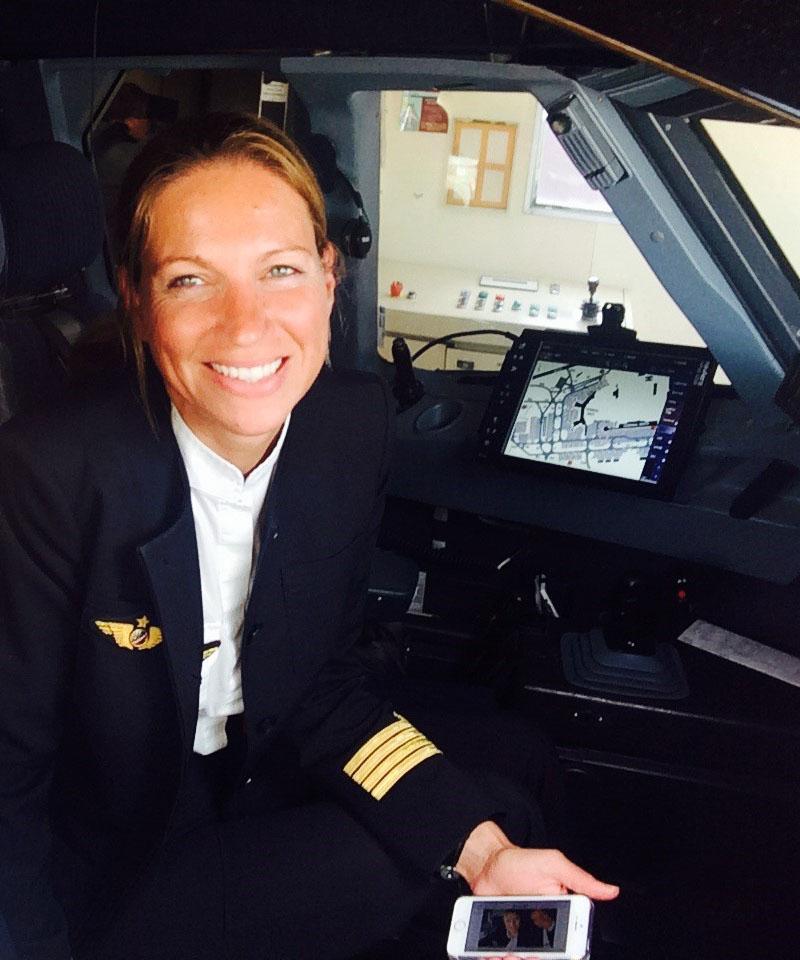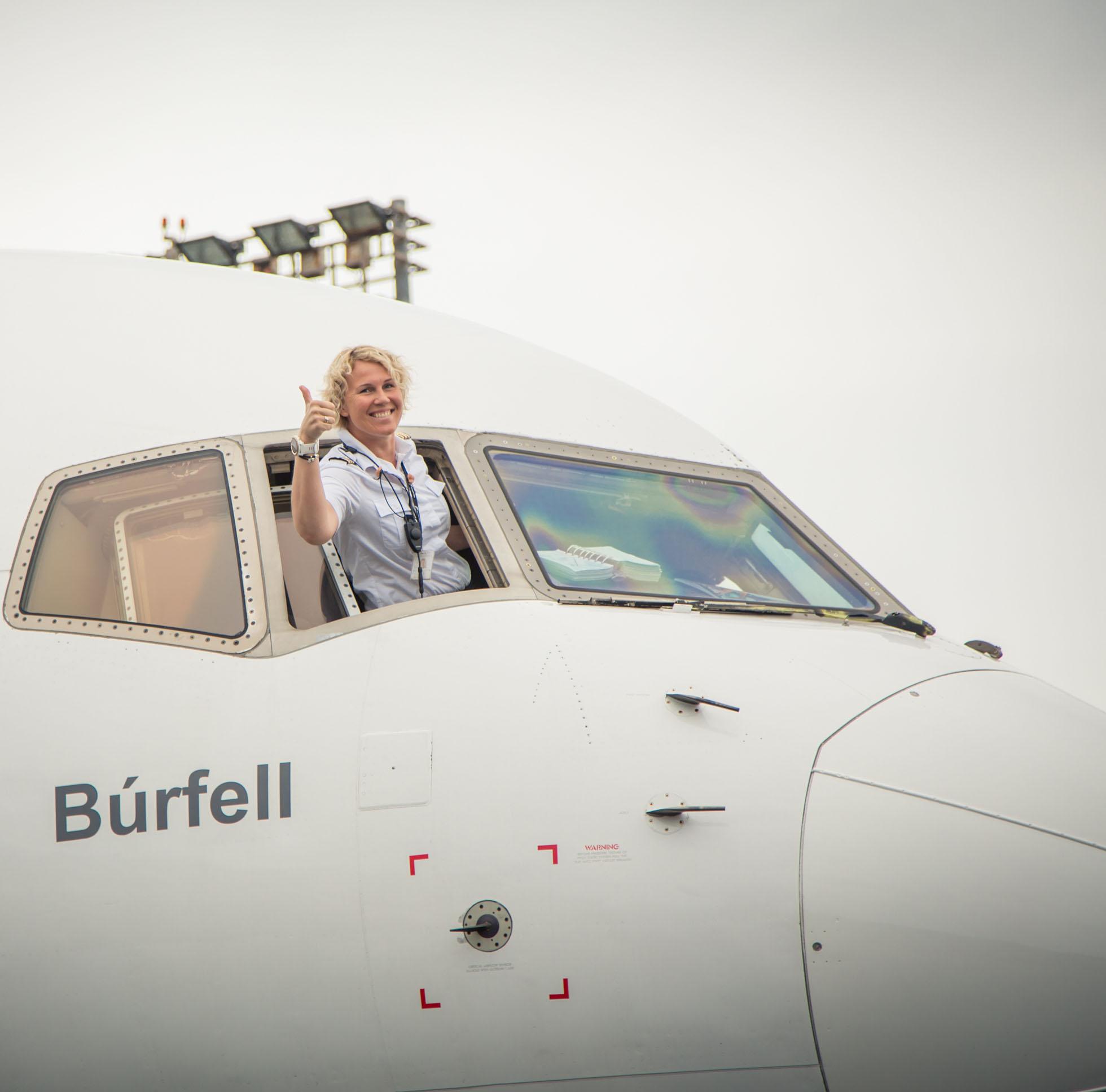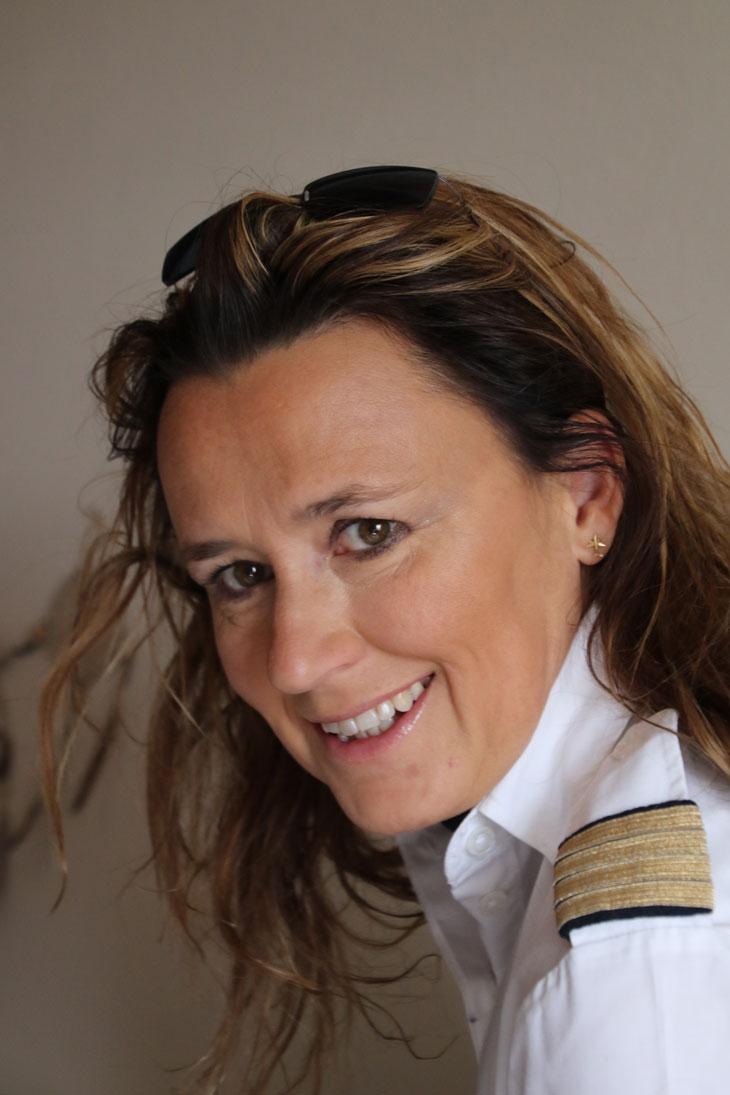

From a dream, which seemed out of reach to becoming a pilot, and a leader who shapes the future of the profession.
We interviewed 4 female pilots who not only chose to become part of the modest “5% of female pilots” in Europe but shattered stereotypes, redefined roles and became the voice of pilots. All 4 of them are active pilot union representatives who dedicate much of their ‘personal’ time to discuss pilot training standards, participate in hundreds of meetings across the world on issues ranging from Collective Labour Agreements to runway safety. We met them at the First International Women’s Day meeting organized by Vereinigung Cockpit in Frankfurt. Between talks on Flight Time Limitations, pilot training and (hard) touchdowns, it became clear that things in the industry are changing – slowly – but changing.
No wonder they are changing, with such role models. We asked Isabel Doppelreiter, Austrian Cockpit Association, Karine Gely, SNPL France ALPA, Sara Hlín Sigurðardóttir, Icelandic Airline Pilots Association, Tanja Harter, Vereinigung Cockpit, how they got into the world of aviation, unions & professional pilots’ associations and how we could attract more female talent?
Isabel Doppelreiter: I started my aviation career as a flight attendant in 2001. After a bit more than 4 years in the cabin I just decided to move up front. I guess flying just happened to me ;)
Karine Gély: As a teenager, I was dreaming of travelling by plane and spent hours watching them take off and land at my local airport. But I had never envisaged to become a pilot: I believed it was unreachable and restricted. Until the day where one of my classmates told me there were pilot selections every year, open to anyone with a scientific background. From that day, becoming a pilot became my ultimate dream and objective.
Sara Sigurdardottir: From a very young age I was interested in the idea of flying and the freedom that I believed came with it. This initial vision is very far from the reality of flying a jet in the extremely regulated and precise environment we operate in today. Nevertheless, I cannot imagine a better job.
Tanja Harter: I‘d say a bit of both... I don’t really know where the passion for airplanes and aviation came from, but it‘s been there as long as I can remember. The idea of becoming a pilot sparked a little later. And the journey to become one, overcoming a number of obstacles on the way was a fairly rational, step-by-step approach. ([I was ] Working as a ground staff besides my studies of electronic engineering, which kept me going financially and also sort of in the business.)
A proud feminist & “Earth warrior”, frequent volunteer for the Global White Lion Trust in Timbavati, South Africa. Born in September 1981, Isabel is the daughter of a rally car racer and his biggest fan, sister of an older brother, who always pushes her to be the best she can possibly be.
Pilot for Austrian Airlines since August 2008. Co-pilot Fokker 100/70 for 8 years. Co-pilot Embraer 195 for 1 year. Isabel Doppelreiter is now Captain “in the making” on Dash 8 400.

Isabel Doppelreiter: Well, obviously the costs. I did all my training privately – left everything behind and moved to Ottawa/Canada to become a student pilot at the Ottawa Flying Club. Aviation is unpredictable, and I had no clue if I would ever find a job, and if I would, where would that be? My first Intentions were to apply for jobs in southern Africa as I am just drawn to this part of the African continent and if I could pick a second home it would be there. But when I got an offer within my home country Austria I gladly took it.
Karine Gély: During the 1st Gulf war, in the early 90’s, it was impossible to find pilot positions with a French license (the EU licenses did not exist at that time). We had no guarantee that Air France would hire us one day. It made me doubt a lot about the validity of my choice.
Sara Sigurdardottir: Money was by far the biggest obstacle. From the age of 18 I had huge loans on my back and for years I calculated everything I spent as lost flight hours.
Tanja Harter: As mentioned already there were a few obstacles along the way. From having the wrong citizenship, to finishing school at the wrong time (during the economic downturn). By far biggest hurdle was the financial one. I had passed all the tests, had my medical... Yet, I did not have enough money. And I was not willing to go for it no matter what the prize or chances.
Captain on Airbus 320, flying for Air France for 21 years now.
I grew up in the South of France, my two parents being math teachers in Montpellier. After passing my high school degree, I followed intensive scientific studies to be able to apply to the pilot national school program. I finally joined and completed the Air France cadet program. After 3 years working as a flight instructor in the US and in France during the 90’s crisis, I joined Air France, flying the airbus 320 as a co-pilot at the age of 25. Thereafter, I flew the B777 and now I am back to the A320 as a captain.

Isabel Doppelreiter: I have always been a “do-er“. I rather act and help change the world than just complain.
It just felt so “normal“ when I started my work within the workers council at Austrian Airlines back in 2012. It was the pilots that I met during this time who told me about the active work I could also do within ACA. So I did. It just felt like the right thing to do.
I must confess that I got a little nervous after being elected as President. I wasn´t sure how the male dominated field would welcome me in such a position.
So far I have only received positive feedback and I am glad that I don´t have to “fight“ for this role model position.
Karine Gély: I accidentally joined union work. To my surprise, I really like it. I am the International Affairs Director of the SNPL board. Working together with pilots from all over the world is very enriching. Trying to maintain satisfactory standards for pilot conditions and aviation safety is a key issue for both pilots’ and passengers’ future.
Sara Sigurdardottir: I remember how proud I was when I secured my first pilot job as a flight instructor and was able to join our pilot union! To be part of this strong group of awesome people felt amazing. After finishing a master’s degree in law, I felt that union work would be a great way to make use of my knowledge.
Tanja Harter: It kind of was a logical development. I was brought in a way, that if you don’t like the situation you‘re in, [you] go ahead and do something to change it. So that‘s what I tried to do. From negotiating my way back into at least partially sponsored program, with some job security and loan options to addressing things that went wrong (at least from my point of view) during training. As a young cadet, you need help to make yourself heard and there were people that helped so I continued to do what they did...and again... If you don’t like what’s going on, go ahead and change it. At least give it a try. Apart from that I‘ve done voluntary youth work for a long time kind of just changed the subject.
My name is Sara Sigurdardottir and I am a 37-year-old captain flying B757/767 for Icelandair. I live in the suburbs of Reykjavik with my husband and our 3 boys. When not working you can find me, often with my boys, skiing or mountain biking somewhere in Iceland.

Isabel Doppelreiter: I personally really believe that we are lacking female role models. The more we appear in public, the more we talk about it, the more young women, little girls will see and simply realise that becoming a pilot IS a career opportunity.
And trust me, I am not saying that there is no such a thing as the glass ceiling. There is. But I guess the more heads we get together the easier we can break it once and for all.
I am not trying to recruit, I am trying to show women that there are so many choices. I literally want to open up their horizons. If they want to become pilots, engineers, stay-at-home mums, it's all good. It's just a matter of seeing all the choices that one has. To make all those choices within reach.
Karine Gély: Pilot is still considered as a men’s job in our society. A lot of young women don’t take it as a job option until they meet or hear about a female pilot. It is probably a matter of poor information coupled with a myth perpetuation.
Sara Sigurdardottir: I think that women in general are just less interested in engineering and machines then men. The technical environment of aviation might not appeal to them as much. Lower self-esteem and fear of failure - both highly unnecessary - could play a part but this is changing as women are growing more confident in their abilities.
Tanja Harter: Primarily a mindset: the mindset of society, leading to a lack of role models and girl just not getting the idea at an early age that this could be something for them. So there‘s also no real encouragement to do it. There‘s lots of prejudices coming with that as well....and for those who get the idea....financial burdens, no job security, and the lack of attractive job offers on the market (jobs that enable a work & life balance, which includes part time options and a reasonable pay.)
... is an engineer, Captain on the A320, CRM instructor, licensed Management Coach & the first person to talk to about “pilot training standards”:
In the early 90s I took the (possibly last) chance for Lufthansa’s (no longer sponsored) program. After 14 years on Boeing Aircraft (8 years 737/6 years B747) as a First Officer and Senior First Officer I became CPT on the A320, which I’m currently flying out of MUC.
I joined Vereinigung Cockpit (VC) literally as I finished flight school. I started with the Qualification and Training group (VC), then joined the IFALPA HUPER in 1999, became Vice-Chair Licensing/Training in 2005, Chair in 2015. I represented IFALPA in the IWG to renew ICAO DOC 9625 (Simulator qualification criteria) the ITQI EBT project and various other occasions.
I actually do have a private life. I love skiing & the outdoors in general. I am usually spending my vacation in a tent somewhere in the rural and remote areas of this planet, including the Arctic. I am married to a fellow Captain.

Isabel Doppelreiter: For us women? I want to see that glass ceiling break. Shattered into tiny pieces. I want to see more women stepping into their purpose. Stepping into the first row. There are so many ideas and inputs that are held back within them because they are occupied with fighting their position on a rather daily basis. Our utmost concern should be aviation safety and how we all can contribute.
Karine Gély: I wish being a pilot could be accessible to anyone having the intellectual capacity and motivation to become one. Free cadet programs should be developed to allow deserving youngsters to achieve their dream whether they are rich or poor.
Flying is a passion that flows in your blood. Knowing that, some firms use this desperate need to fly to make money while abusing the pilots: pay to fly, bogus self-employment, precarious employment… It would be a great achievement to prohibit those practices in Europe and around the world.
Sara Sigurdardottir: Most European pilots are exhausted due to high workload. That shouldn't be normal. To tackle this, we need to eliminate atypical employment and make direct employment of pilots the norm! I also think that pilot training needs to change dramatically. In the performance-driven training that pilots routinely go through the mental side is often neglected. More focus should be on strengthening the mental side as is done in training programs for professional athletes. The result would be happier pilots and hence a safer sky.
Tanja Harter: What needs to change? Everything that addresses what I said before. Not to have to make the choice family OR career but being able to have family AND a career as a pilot. And get their (additional) qualifications equally respected, just as the male colleagues.
Isabel Doppelreiter: .....my first SOLO Flight on September 27th 2005. Just breath-taking and a smile that I will always carry with me.
Karine Gély: My first flight in the A320. At the very end of my type rating, after numerous hours in the simulator, I finally reached the right seat of the real airplane for off line training (no passenger on board). I will never forget my first take off, the feel of acceleration, the vision of the runway running under my feet and the plane lifting in the air. I was there!
Sara Sigurdardottir: When I first got paid for flying! I had just received my private pilot license and got offered to fly soccer team players to a match that took place on a little island just outside of the coastline of Iceland. It would have taken them half a day to drive to the coastline and then to take a ferry but the flight only took 30 minutes. They paid me fuel and lunch money and I got free flight hours.
Tanja Harter: Many....Funny enough not so much the first solo, although I still remember it well.
The first pattern in the B737 during base training, the aircraft I‘ve always wanted to fly, watching the sun rise over the mountains on an early shift, the moment the power kicks in at the beginning of a take-off run, watching the northern lights on a long night over the North Atlantic, the occasional falling star included.